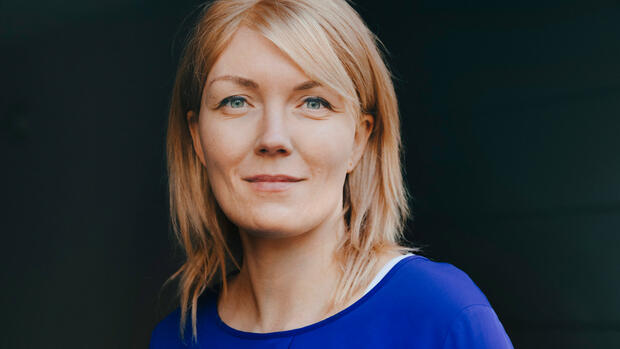After Outfittery and Planetly, the entrepreneur founded another start-up.
(Photo: Nala Earth)
Berlin Outfittery founder Anna Alex is one of the best-known faces in the German start-up scene. With her now-defunct company Planetly, she wanted to help companies reduce their CO2 emissions. Now the 38-year-old is addressing what she sees as a bigger crisis: the dramatic decline in biodiversity worldwide.
“50 percent of global economic output is directly dependent on a functioning nature,” Alex told Handelsblatt. At the OMR Festival in Hamburg, she presented her latest project, Nala Earth, to the public for the first time on Tuesday.
The market for this is just emerging: many companies are likely to face significantly higher requirements for their sustainability reporting in the future as a result of EU regulations. Nala Earth develops software that enables companies to measure and control their impact on nature. Factors are water scarcity, biodiversity and land use.
Nala Earth: Founders initially finance the start-up themselves
“We want to show companies what impact they have on nature and biodiversity,” explains Alex. Nala Earth starts it together with the two Swiss Nick Zumbühl and Nicolas Somogyi. When asked what drives her, Alex has a simple answer: “I sleep better knowing I’m part of the solution.”
So far there has been no outside capital at Nala Earth, but that should change soon. In the meantime, the three founders want to finance the start-up out of their own pockets – the sale of Planetly also makes this possible.
Thanks to Alex’s extensive network, some companies have already become aware of the start-up. In the meantime, pilot customers would give feedback. “We don’t want to lock ourselves in a quiet little room for twelve months,” says the Berliner.
>> Read also: “Wake-up call for the economy”: Federal government wants to invest four billion euros in ecosystems
First of all, Nala Earth wants to set up a database that will help to map the state of nature worldwide. Companies should then combine this information with their statements in order to be able to make an assessment of their influence. “We can’t manage what we can’t measure,” Alex is certain.
She does not want to be deterred by the current economic weakness and the difficult financing conditions for start-ups with her new project: “I really like to build something where nothing was before. That gives me a lot of energy.”
Companies are looking for new sustainability standards
With the preservation of so-called biodiversity, Alex is focusing on a topic that is only just gaining momentum in the business world. Alex is convinced that this is the next big wave of sustainability. It is more important than ever to take action: “It is estimated that 150 species go extinct on earth every day; the rate of extinction is increased ten to one hundred times due to human influence.”
Only recently, the international cosmetics group L’Oréal sent out a signal on the subject of biodiversity. He is committed to restricting land use and investing in protecting the diversity of species, ecosystems and habitats. At the same time, L’Oréal noted how difficult it is currently to even recognize and evaluate the influence.
Not many are doing the work yet. Tobias Raffel, director of the Future Institute at the international business university ESMT Berlin, explains that only five percent of the world’s 500 largest companies have set biodiversity targets – compared to 83 percent for the climate issue.
Nala Earth is Alex’s third startup. As early as 2012, she launched the men’s fashion shopping provider Outfittery, which is still managed by her then co-founder Julia Bösch. In 2020, Alex dedicated himself to Planetly. The platform for measuring CO2 emissions quickly attracted well-known companies such as BMW and Hellofresh as customers and raised 7.8 million euros in venture capital for the development of the technology.
>> Read also: The climate crisis threatens Asia’s economic rise, economists warn
Quite surprisingly, at the end of 2021, Alex sold her company in the middle of a boom phase to the US software provider One Trust, which then closed Planetly after just one year and evicted 200 employees.
Alex prefers not to comment on this, but says: “I was upset and disappointed by the buyer’s decision.” At the same time, you have to keep in mind how much the market has changed as a result of the economic crisis and more difficult financing conditions. Her focus was on the employees: “In the meantime, everyone has great new jobs.”
More: German authorities hardly rely on sustainability when it comes to procurement
